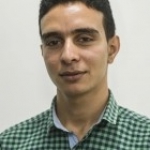The healing of the ‘Pharaonic Sea’
Kafr-Fisha, Egypt -- It’s suffocating for me to walk through Cairo’s streets and squares. Between the tall buildings, the incessant horns of cars standing still in traffic, the sea of people hopping on a bus or a taxi to get to work or bring their children to school -- it can get quite overwhelming and hectic.
Life in Egypt’s villages in the countryside, where I grew up, is completely different from the capital of 20 million souls, a megapolis that never sleeps. I was born in the small hamlet of Shamma, about 65 kilometers north of Cairo, where many people don’t know much about life in the villages nestled along the Nile.
Countryside has a unique feel that’s known only to those who have grown up there, in the middle of green pastures, where people like me are brought up to love the land that gives us so many good things.
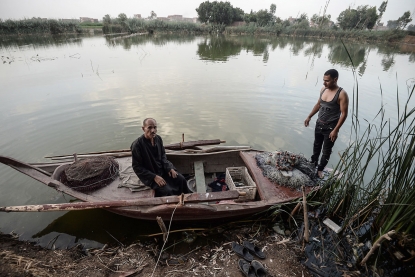 A fisherman on the "Pharaonic Sea," Juen, 2018. (AFP / Mohamed El-shahed)
A fisherman on the "Pharaonic Sea," Juen, 2018. (AFP / Mohamed El-shahed)I’ve been working in Cairo for years, but as soon as I get a chance, I take my car and return to the village where I grew up, to walk in the agricultural fields, breathe the fresh air and gaze out at the horizon spread out as far as the eye can see.
In Egypt, the love of the land is intermixed with the smell of the Nile, the giant river that we consider a gift of God; a symbol of fertility that waters the land along its banks.
When I was a child, I was surrounded by farmers and fishermen who loved the land and the water with such ardor that I often wondered “Why all this love? All jobs are the same -- the whole point is to make money and earn your sustenance for the day. So why do they have so much passion for their work?”
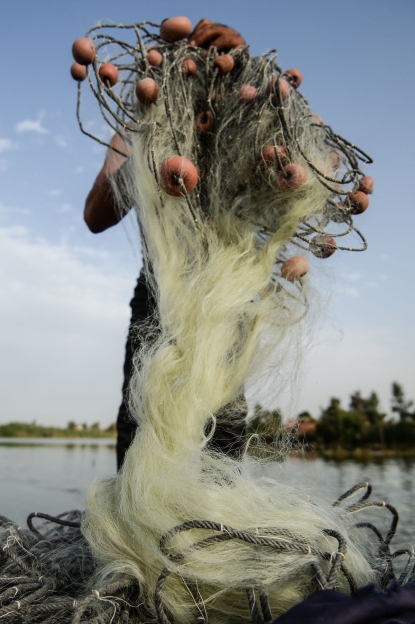 (AFP / Mohamed El-shahed)
(AFP / Mohamed El-shahed)As I grew up, I eventually learned through my interactions with the farmers and fishermen that they didn’t consider their profession as simply a way to make a living. They looked at their jobs as love that was passed down from generation to generation.
Once I was showing a friend of mine from the city around my village and he said that he wanted to buy fish. I immediately took him to Fisha village, which is known around these parts for the quality of its fish.
I’d actually never been there before and as soon as we got there, I was drawn by the feeling in the air. The fishermen cast their nets in a lake known as the “Pharaonic Sea.” They still use very primitive tools, but are very successful, so I wanted to learn their secrets and decided to spend a day there, taking pictures.
 (AFP / Mohamed El-shahed)
(AFP / Mohamed El-shahed)The “sea” is a large lake that the locals say used to be part of the Nile, but separated from the mighty river some 50 years ago. Today it stretches over ten square kilometers and is the main source of livelihood to the people living in some 50 villages along its shores. They are all concerned about their future, as the water level has been gradually declining.
The fishermen in this area, famous for its tilapia fish, want to keep alive the legacy of their grandfathers and fathers by staying on the water, throwing their nets and catching fish.
Emad lives in a modest house of adobe bricks, typical in Egyptian villages. He holds a government job during the day, but in the evening he indulges his passion -- he sets out in a small wooden boat, throws his net and waits for the catch. He usually invites relatives and friends to join him and offered me to come along.
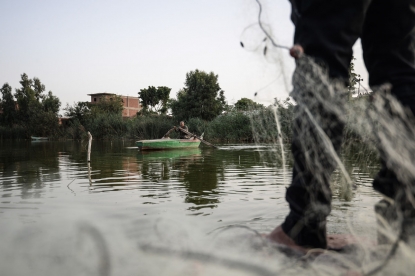 (AFP / Mohamed El-shahed)
(AFP / Mohamed El-shahed)The boat glided along the still water, sending ripples to each side, as if re-awakening the lake. Eventually other boats joined us. The fishermen threw their nets into the lake and then hit the water with a fishing rod called the “madra” in an effort to lead the fish into the nets.
They did it for about an hour before starting to pull up the nets -- some fish tried to escape, as if asking the lake to embrace them once more.
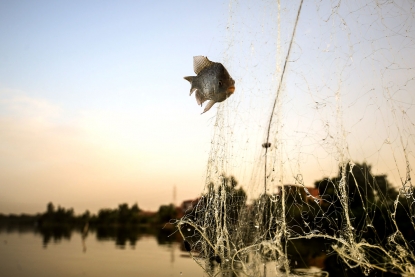 (AFP / Mohamed El-shahed)
(AFP / Mohamed El-shahed)The whole time out on the water was filled with laughter and support -- if another boat requested help with something, others would oblige. When we were done, we returned to Emad’s house, where we drank tea boiled on charcoal. I tried to excuse myself and leave, but the fishermen wouldn’t let me leave without tasting the fish that we had caught.
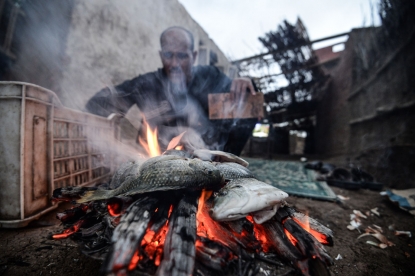 (AFP / Mohamed El-shahed)
(AFP / Mohamed El-shahed)They cooked the fish over charcoal and we ate it with bread and a green “baladi” salad, made with tomatoes, cucumbers, peppers and onions.
 The daily catch. (AFP / Mohamed El-shahed)
The daily catch. (AFP / Mohamed El-shahed)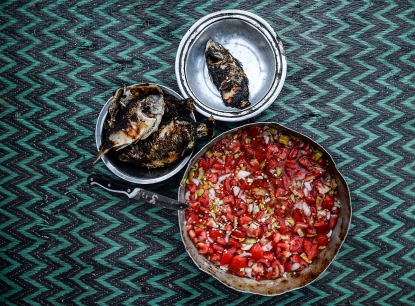 Supper. (AFP / Mohamed El-shahed)
Supper. (AFP / Mohamed El-shahed)
Everyone helped in preparing the food and the house filled with laughter and religious chants broadcast on television.
 Drinking tea at sunset, June, 2018.
(AFP / Mohamed El-shahed)
Drinking tea at sunset, June, 2018.
(AFP / Mohamed El-shahed)We all sat on the floor to eat and the fishermen started talking about their daily lives, their responsibilities and the endless demands of their children.
As I sat with them, I had a feeling that as they threw their nets, these fishermen somehow washed away some of the stress in their life in the waters of the lake, taking a deep breath to continue their journey in life.
“As the sea is the source of life for the fish, it is also a source of life for humans,” one of them told me.
“Fishermen are the sons of nature and the sea is like a father and mother to us.”
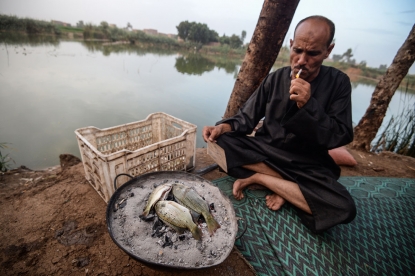 (AFP / Mohamed El-shahed)
(AFP / Mohamed El-shahed)


